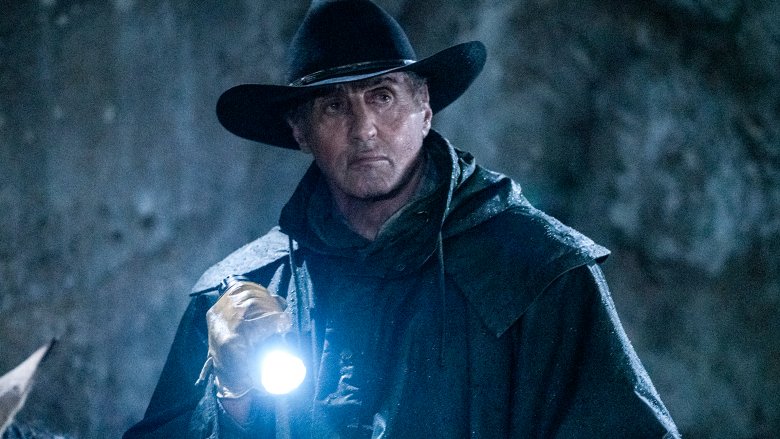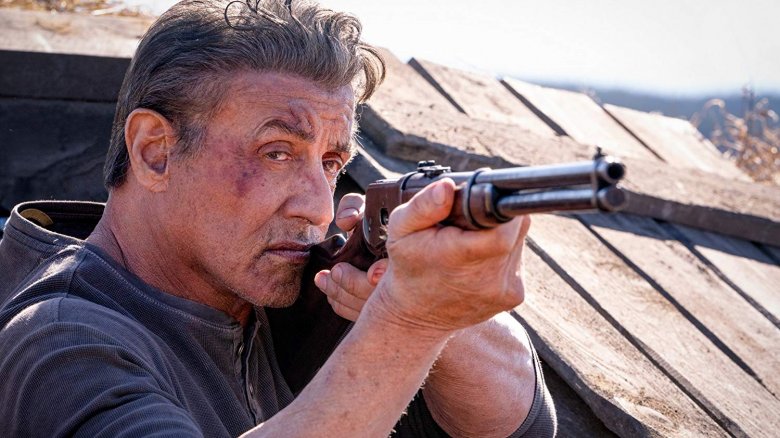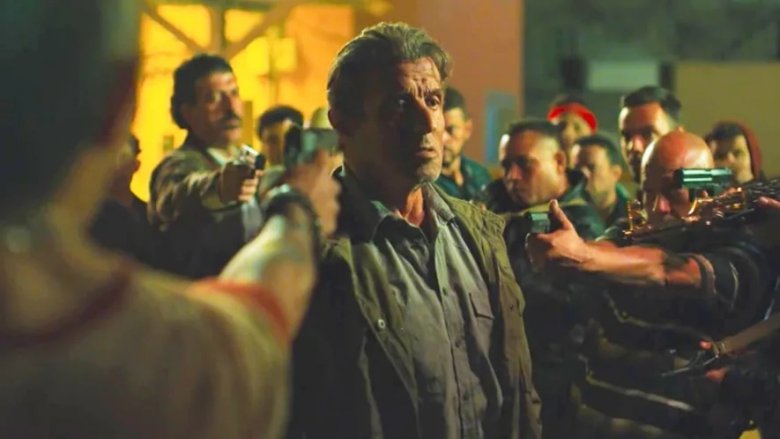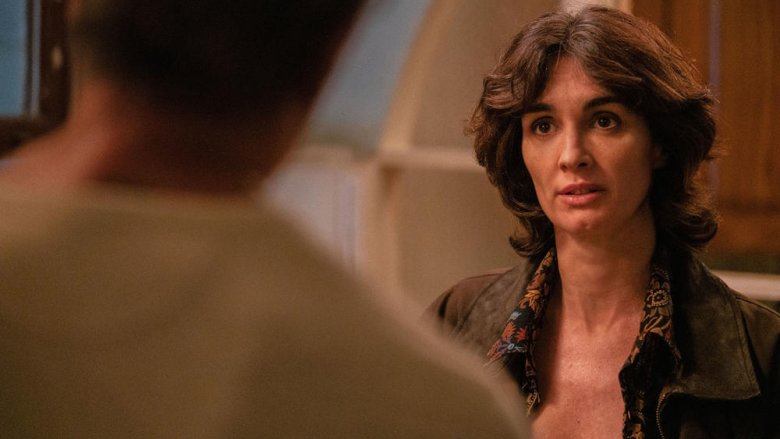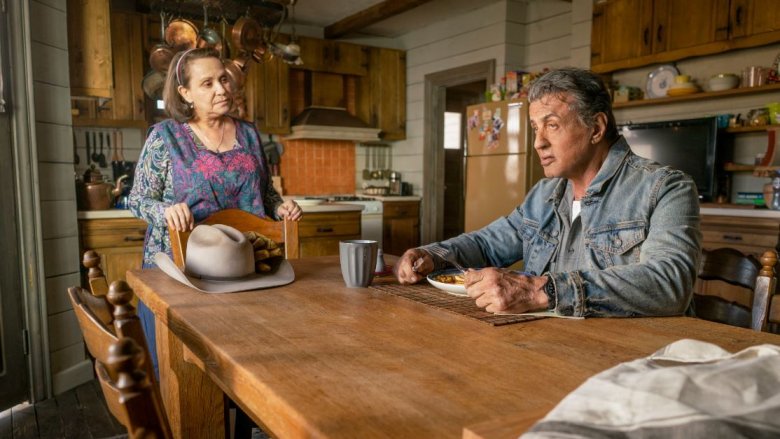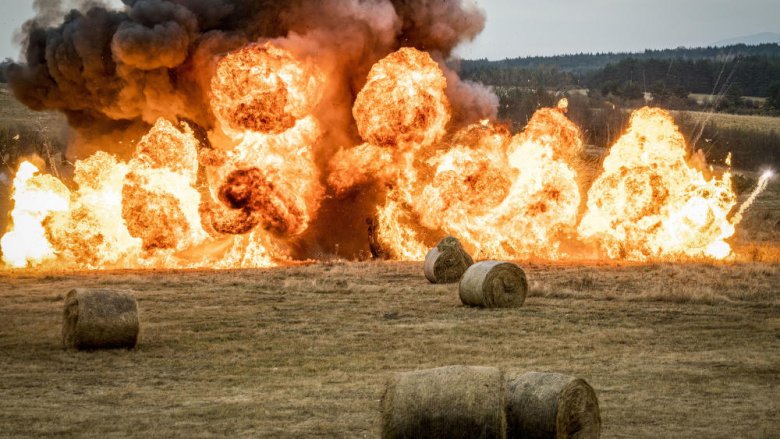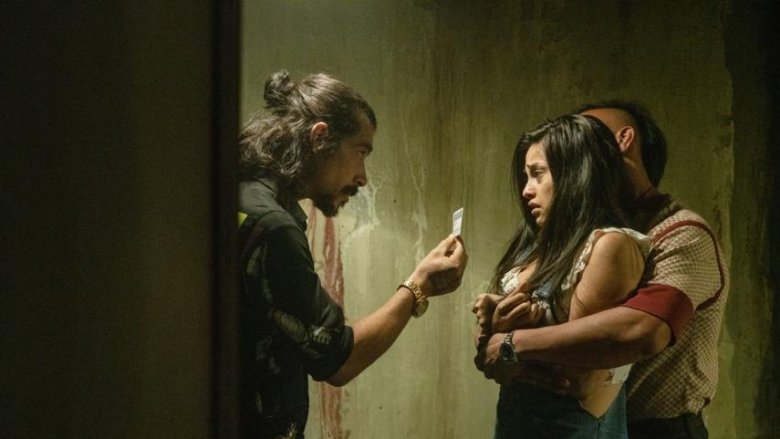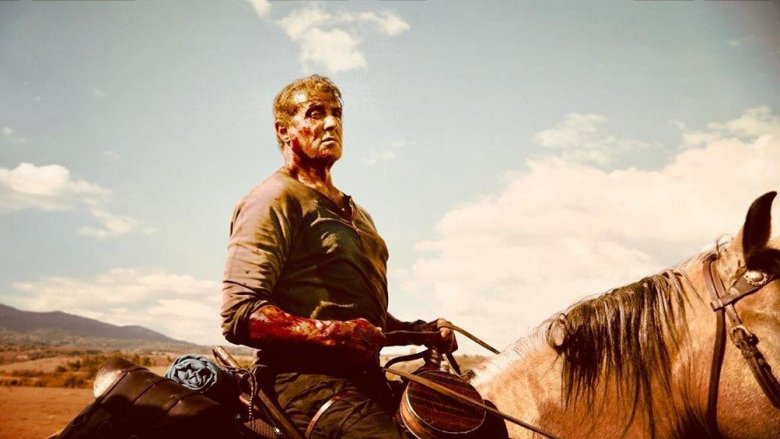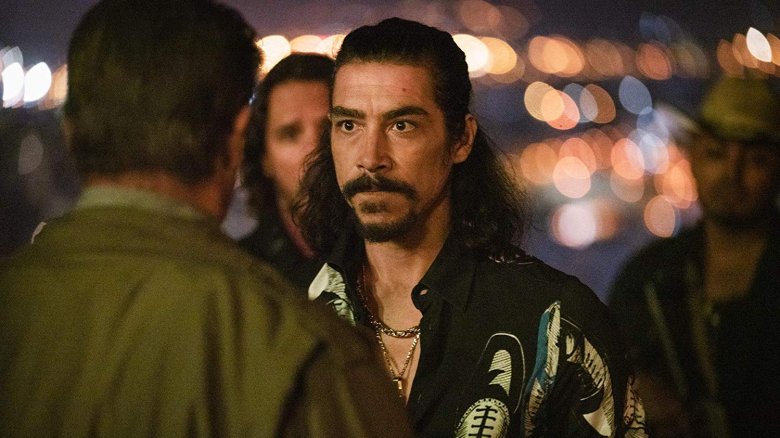The Ending Of Rambo: Last Blood Explained
Sylvester Stallone's career has been successful enough that he's become internationally known for not one, but two long-running franchise roles: Boxing legend Rocky Balboa and eternal warrior John Rambo. Both of those creations have found a new life in the 21st century, but one of them seems to have reached the end of his journey. With Rambo: Last Blood, Stallone hopes to put an exclamation point on the end of the five-film long sentence that is John Rambo's story — and we're here to pick apart exactly how he did it.
As the trailers have shown us, Last Blood follows Rambo's struggle to get his niece Gabrielle back from a Mexican cartel after they abduct her as part of a human trafficking ring. Because this is a Rambo movie, we know to expect a bloody confrontation, but that doesn't mean the ending is entirely predictable, or even entirely cut and dried. With that in mind, let's dig into the ending of Rambo: Last Blood. Spoilers ahead!
The warrior can never find peace
John Rambo began his cinematic journey in First Blood as a man who was just trying to find a way to move on in a country that didn't seem to have a place for him anymore. In the four films since then, Rambo's fought a series of external wars, while also constantly raging a battle within himself to quell a warrior's rage that's been a part of him for longer than he sometimes cared to admit. In discussing why he chose to return to the character for one more film, Sylvester Stallone highlighted the sense in Rambo's life that peace just doesn't seem to be an option.
"You can totally end the story with him going home, having that shot of him going down the driveway, which is completion," he said. "But a character like that — does he ever really go home? I jotted down on a Post-It: 'He came home, but he never arrived,' and I went, there's a movie here. The warrior can never find peace. He just can't."
That sense of never truly feeling at peace is physically manifested in the film as the tunnels Rambo digs. It's also encapsulated in something he tells Gabrielle early on: He never changed, he just learned to "keep a lid on it." Through the ultra-violent ending of the film, we see that the lid wasn't on too tight.
Cartel fallout
The most obvious immediate fallout of the ending of Last Blood — which culminates in Rambo's epic subterranean battle with Hugo Martinez (Sergio Peris-Mencheta) and his men beneath the Rambo family ranch in Arizona — is the impact Rambo's one-man war is likely to have on the cartel itself. Obviously, Hugo and all of his best enforcers are dead after the firefight in Arizona, and they're all killed in rather horrific ways. Back in Mexico, Hugo's brother Victor is also dead, leaving the cartel literally without a head. Does that mean Rambo's revenge actually did some good?
Well, the bigger implications of the mass death of so many cartel members at once are worth discussing, but Rambo himself admitted that his vendetta was more about vengeance than justice. He wanted to inflict pain, in part because he saw for himself how scared the women kidnapped by the Martinez brothers were. Even when he freed them, they were terrified to leave. So yes, there will be some immediate fallout, but the power vacuum could very well be filled by another cartel rather quickly unless more drastic action is taken in Rambo's dark world.
What happens to Carmen
A hallmark of the Rambo franchise has always been the appearance of a somewhat aspirational, somewhat hopeful figure in John Rambo's life right when he's at his most hopeless. This was his mentor Col. Trautman in the first film, and in recent films it's taken the form of a woman who's trying to convince Rambo to move on with his life. In Last Blood, that's Carmen (Paz Vega), a journalist covering Mexican cartels who lost her sister to their human trafficking sex slave machine. Though she's somewhat pessimistic herself — she encourages Rambo to grieve and move on after Gabrielle's death — Carmen cleans John up when the Martinez brothers beat and scar him, then helps him find the right connections to exact vengeance later, even though she's reluctant to offer him any more help.
With Rambo's quest for blood over at the end of the film, what happens to Carmen? There's no way she wouldn't hear about his one-man defeat of the Martinez cartel and all of their enforcers, and it's hard to imagine she'd just be a bystander after forming a bond with Rambo. It's quite possible that the aftermath of the film creates an opportunity for her to step in and tell the world the story of what happened that day on the Rambo family ranch, why John Rambo did what he did, and how his life led him to that point. She could be the chronicler, while also shedding light on the evils of human trafficking.
What happens to Maria
Though Rambo's blood relatives have passed on since he's returned to America, he does have a chosen family that he considers his true relatives: His "niece" Gabrielle (Yvette Monreal) and her grandmother Maria (Adriana Barraza), who looks after the Rambo family estate and takes care of Gabrielle because her mother has passed away and her father is a deadbeat living in Mexico who never seemed to care about Gabrielle in the first place.
The tragic loss of Gabrielle to a cartel-induced drug overdose is the emotional linchpin of Last Blood, and galvanizes Rambo to do something about the cartel even if that something is little more than cold, brutal vengeance. Before that happens, though, Maria leaves the Rambo family ranch behind, taking her memories of Gabrielle with her.
So what happens to Maria now that Rambo has done what he's done? If he dies (more on that later), it seems likely that she's the last living person he'd leave any kind of inheritance, which places her at the center of his story as the public learns of his war with the cartel. It's nice to think of her doing something like starting a scholarship in Gabrielle's name, or at least finding some degree of peace with whatever John left her, even if it's only his passion for protecting his family.
Political implications
Rambo: Last Blood is a film that primarily wants to focus on two things: The human story of a damaged man and the family he's chosen, and the kind of over-the-top action we tend to associate with this franchise. It delivers on both of those elements, but it also raises a few political implications that it only deals with in glancing ways.
Yes, this is a human story about a man pushed to the edge until he feels he has nothing left to do but fight (again), but it's also a story in which a couple dozen members of a Mexican cartel make their way to Arizona with assault rifles and SUVs to kill a guy who just happened to have enough firepower to bring them all down and blow up half his property while he was at it. Yes it's a Rambo movie, but it still exists in a version of our world, and if you saw that same thing happen on the news tomorrow your jaw would be on the floor.
With this in mind, there are bound to be some political implications stemming from Rambo's last stand against the cartel, and they're going to have to do with border security. John Rambo's personal war will have lasting consequences for his version of the United States, and they may not all be good.
Crackdown in Mexico?
Rambo: Last Blood does not, as we've already discussed, spend much time lingering on the political and logistical implications of its story, because it wants to focus on both the emotion and the action and get you in and out in under two hours like a rapid-fire thriller. There are still hints, though, that the world of this story is one in which the Martinez cartel doesn't get hit with a lot of resistance as they go about their dirty business. Rambo mentions to Maria at one point that calling the police doesn't help anyone because of the border (though there are other avenues he could have explored if given the time), and at one point we see cartel members showing up to a crime scene and walking right through the police with their guns drawn. The implication is that these guys can do whatever they want with impunity, and only Rambo can stop them.
If that's the case, then what happens after the battle in Arizona, when the dust settles and investigators begin digging into exactly what went down? Well, the cartels might not go away, but a greater public focus on human trafficking (with a little help from Carmen) could lead to some kind of crackdown in Mexico that at least slows things down for a little while.
Rambo's final fate
Now we come to what might be the only truly ambiguous point in the film in terms of its main plot: What actually happens to John Rambo? As the film ends, Rambo has just won his battle with the cartel, literally cutting out Hugo Martinez's heart in the process, and he stumbles up onto his porch to sit in a rocking chair and nurse the gunshot wound in his abdomen. As he does, the camera zooms out, and we see the chair is still rocking as the credits roll. Rambo's alive, right?
Well, not so fast, because the film also ends with Rambo's monologue about cherishing the memories of those he's lost, which is followed by a credit montage of moments from all four previous films. This culminates in a wounded, bloody Rambo climbing on a horse and riding off, away from the ranch. Here's the thing, though: The film made a point of showing us that Rambo drove his horses away from the barn to protect them from the cartel. Did this horse wander back, or is that Rambo's passage into the next life in the form of a ride into the sunset? The film doesn't tell us, but... it is called Last Blood.
Fear of copycats
We've already talked quite a bit about the fallout of Rambo's last battle with the Martinez cartel, and how it might affect various characters as well as various political and criminal entities operating in the United States and Mexico. There's one more major implication that we haven't touched on yet, though, and it's worth examining.
John Rambo is a legend in the U.S. military, as several films in the franchise have established. Outside of that, though, he's a private person who spent much of his adult life outside of America and until the events of Last Blood lived a quiet life on a ranch for more than a decade. So, unless they've read up on the events of First Blood or remember hearing about it when it happened, this firefight at the Rambo ranch will be the first time many Americans are hearing about him, and they'll be hearing about him as a guy who took down a cartel single-handedly. Sadly, this is the kind of thing that could inspire copycats, particularly among right-wing extremist groups. It's not something the Rambo films touch on because they haven't taken place in America in many years, but in 2019, someone like John Rambo could get some unwelcome, misguided company.
Will it ever really end?
If you trace the Rambo franchise all the way back to First Blood, its overarching narrative is one of violence begetting violence. Rambo is a warrior because he's good at it and because he was trained to be, but he doesn't draw first blood. He's pushed to the edge, and then he pushes back, and then the cycle continues even as he tries to, in his words, keep a lid on it. In Last Blood, this sense of being pushed too far culminates in his conversation with Carmen, in which he explains that nothing can ever be done as long as innocent people are being harmed.
There's an undercurrent of hope within the end of Last Blood, though, as Rambo's parting words to the audience meditate on memory and loss. He doesn't want other people to be like him. He doesn't want people to get hurt and suffer senselessly. He just knows he has something inside him that will react when that does happen, and by the end of the film he seems to have found a way to make peace with that through memory. In those final lines, there's a hint of optimism in this often dark film, and the sense that if Rambo really is gone, the cycle of violence might finally stop recurring. If he can draw last blood, maybe it will finally be enough.
